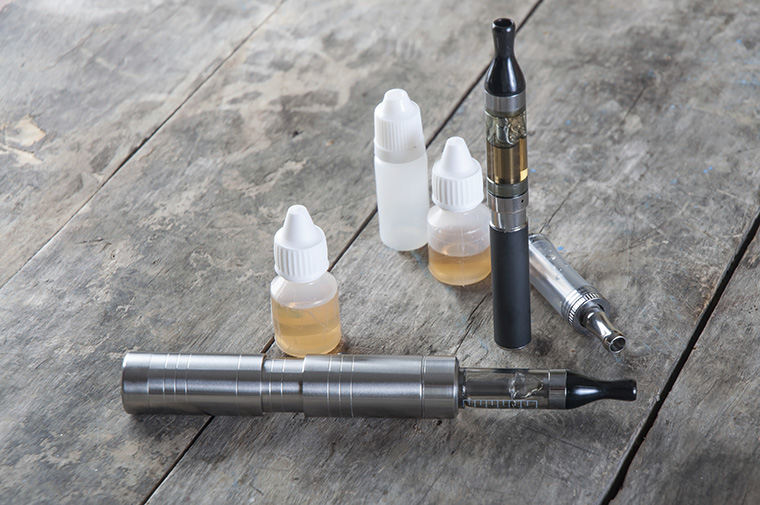Legislators crack down on e-cigarette liquids
Legislators crack down on e-cigarette liquids
April 28, 2014
Although the U.S. Food and Drug Administration announced regulations for electronic cigarettes on April 24, Illinois is one step ahead.
After waiting more than a year for e-cigarette regulations from the FDA that were supposed to be proposed in Fall 2013, state legislators took it upon themselves to restrict e-cigarettes.
“It always takes time to get things done at the federal level,” said Bechara Choucair, Chicago Health Commissioner. “We really are excited that the FDA took the first steps in introducing the proposed regulations.”
A bill introduced Feb. 14 by Rep. Robyn Gabel (D–Evanston) would require e-cigarette cartridges and liquids to be sold in protective packaging to prevent children from ingesting the toxic nicotine liquid that fills the devices.
Gabel said she was inspired to introduce the bill after a physician pointed out the dangers of e-cigarettes, which are generally assumed to be healthier than tobacco cigarettes. Gabel said swallowing 10 milligrams of the e-cigarette liquid could kill a toddler and 60–100 milligrams would be fatal for an adult. E-cigarette liquid usually comes in a 20-milliliter bottle, which holds 240 milligrams of concentrated nicotine. If a child or an adult were to ingest a teaspoon of the liquid, he or she could die within an hour, she said.
The House of Representatives approved the measure 105–10 on April 1. Although the FDA proposed measures to regulate the e-cigarette industry, the bill still awaits a vote in the state Senate.
“In concept we do like it when local and state government take action to regulate products,” Choucair said. “But with federal rules and regulations, it’s going to take a while for those to kick in. We did not wait for the FDA to act.”
Gabel said she expected e-cigarettes to be federally regulated in the fall of 2013, but the FDA did not propose strict regulations until April 24. The FDA guidelines require manufacturers of the currently unregulated products to submit the cigarette substitutes to the FDA for review. Manufacturers will also be restricted from offering samples or selling to minors. The public has 75 days to voice concerns before the legislation takes effect, according to an April 24 FDA press release.
Because e-cigarettes are rapidly increasing in popularity, Illinois representatives did not want to wait for federal regulation, Gabel said, adding it was necessary to propose state regulation.
“There are many issues that the state just takes responsibility [for] their own legislation and regulation while awaiting [federal regulation] because you never know how long it will take,” Gabel said.
Victoria Vasconcellos, owner of Cignot, an e-cigarette store with four suburban locations, said the state bill has no guidelines and failed to gather input from the tobacco industry. She said she does not know how the law would affect her business because it is too vaguely written.
“There is no disaster happening,” Vasconcellos said. “If the FDA thought it was some horrible emergency, they would be doing something quickly.”
The bill calls for the Illinois Department of Public Health to develop packaging guidelines and child-proof e-cigarette liquid refill bottles, Gabel said. Legislators are not the only ones warning against the liquids—poison control centers have also made efforts to inform consumers of the dangers associated with e-cigarette liquids.
“We want to prevent it from becoming a huge problem,” said Carol DesLauriers, operations director at the Illinois Poison Center. “Nicotine is extremely toxic. It has the potential to be very dangerous. It is wise for consumers to know about the potential toxicity and that it should be treated very safely.”
An April 4 Centers for Disease Control and Prevention report shows that calls to poison centers regarding e-cigarette liquids jumped from one call in September 2010 to 215 calls in February 2014.
Vasconcellos said the CDC findings are valid, adding that poison centers receive more than 20,000 calls each year about toothpaste and makeup poisoning, but no one is cracking down on those products.
“Why would you jump to conclusions?” Vasconcellos said. “E-cigarettes stand to save hundreds of thousands of lives.”
Although e-cigarette liquids may be dangerous when consumed incorrectly, Vasconcellos said they have the ability to help smokers break their addiction. She said she agrees that children should be protected from the liquids, but that electronic cigarettes are a better alternative to smoking.
“I want parents to go to their kids’ weddings,” Vasconcellos said. “We get parents off of smoking. Their kids will not smoke and parents are going to become grandparents to those children’s children. We want to save the kids, so let’s improve their parents’ lives.”








